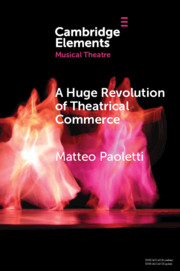Select Bibliography
Baia Curioni, S. Mercanti dell’Opera: Storie di Casa Ricordi (Il Saggiatore, 2011)
Balme, C. ‘The Bandmann Circuit: Theatrical Networks in the First Age of Globalization’, Theatre Research International, 40 (2015), 19–36
Balme, C.‘Maurice E. Bandmann and the Beginnings of a Global Theatre Trade’, Journal of Global Theatre History, 1 (2016), 34–45
Barone, G. ‘La modernizzazione italiana dalla crisi allo sviluppo’, in Sabbatucci, G and Vidotto, V (eds.), Storia d’Italia (Rome-Bari: Laterza, 1995), vol. III, pp. 256–370
Bastos, S. Carteira do Artista: Apontamentos para a Historia do Theatro Portuguez e Brazileiro (Bertrand, 1898)
Becker, T. ‘Globalizing Operetta before the First World War’, Opera Quarterly, 33 (2017), 7–27
Benzecry, C. E. ‘An Opera House for the “Paris of South America”: Pathways to the Institutionalization of High Culture’, Theory and Society, 43 (2014), 169–96
Branchard, A. Comment on organise une tournée mondiale (Stock, 1913)
Caamaño, R. La historia del Teatro Colón 1908–1968 (Cinetea, 1969)
Carelli, A. Emma Carelli: trent’anni di vita del teatro lirico (Maglione, 1932)
Cavaglieri, L. Trust teatrali e diritto d’autore (1894–1910): La tentazione del monopolio (Titivillus, 2012)
Cetrangolo, A. E. Ópera, barcos y banderas: El melodrama y la migración en Argentina (1880–1920) (Biblioteca Nueva, 2015)
Cetrangolo, A. E. and Paoletti, M (eds.), I fiumi che cantano. L’opera italiana nel bacino del Rio de la Plata (Alma Mater Studiorum Bologna, 2020)
Cimmino, A. ‘Walter Mocchi’, in Dizionario Biografico degli Italiani (Istituto dell’Enciclopedia italiana, 1960), vol. 75 (2011)
Coli, J. M. ‘O negócio da arte: as influências da gestão e organização italiana na ópera lírica em São Paulo’, Opus, 22 (2016)
Crespi Morbio, V. (ed.), Caramba: mago del costume (Amici della Scala, 2008)
Cymbron, L. ‘Camões in Brazil: Operetta and Portuguese Culture in Rio de Janeiro, circa 1880’, Opera Quarterly, 30 (2014), 330–361.
Degrada, F. ‘Il segno e il suono: Storia di un editore musicale e del suo mondo’, in Musica, musicisti, editoria: 175 anni di Casa Ricordi, 1808–1983 (Ricordi, 1983)
Devoto, F. J. Historia de la inmigración en la Argentina (Editorial Sudamericana, 2003)
Devoto, F. J. Storia degli italiani in Argentina (Donzelli, 2007)
Forgacs, D. and Gundle, S. Mass Culture and Italian Society from Fascism to the Cold War (Indiana University Press, 2008)
Frajese, V. Dal Costanzi all’Opera: cronache, recensioni e documenti in 4 volumi (Capitolium, 1977)
Gentile, E. ‘L’emigrazione italiana in Argentina nella politica di espansione del nazionalismo e del Fascismo’, Storia contemporanea, 3 (1986), 355–96
Gheusi, P. B. Guerre et Théâtre (Berger-Levrault, 1919)
Greenblatt, S. ‘Cultural Mobility: An Introduction’, in Greenblatt, S (ed.), Cultural Mobility: A Manifesto (Cambridge University Press, 2010)
Leonhardt, N. Theater über Ozeane: Vermittler transatlantischen Austauschs (1890–1925) (Vandenhoeck & Ruprecht, 2018)
Lugné-Poe, . La Parade: Sous les etoiles. Souvenirs de théâtre (1902–1912) (Gallimard, 1933)
Mancini, F. Il Teatro di San Carlo 1737–1987 (Electa, 1987)
Marinuzzi, G. Tema con variazioni: Epistolario artistico di un grande direttore d’orchestra (Arnoldo Mondadori, 1995)
Mocchi, W. I moti italiani del 1898: lo stato d’assedio a Napoli e le sue conseguenze (Enrico Muca, 1901)
Morini, M., Iovino, R, and Paloscia, A (eds.), Epistolario (Libreria Musicale Italiana, 1996)
Morini, M. and Ostali, P, Jr. (eds.), Casa Musicale Sonzogno: Cronologie, saggi, testimonianze (Sonzogno, 1995)
Nicolodi, F. ‘Il teatro lirico e il suo pubblico’, in Soldani, S and Turi, G (eds.), Fare gli italiani (Il Mulino, 1993), vol. I, pp. 257–339
Nugnes, P., and Massimini, S. Storia dell’Operetta (Ricordi, 1984)
Orselli, C. Pietro Mascagni (L’Epos, 2011)
Paoletti, M. ‘La red de empresarios europeos en Buenos Aires (1880–1925). Algunas consideraciones preliminares’, Revista Argentina de Musicología, 21 (2020), 51–76
Pellettieri, O. (ed.) Inmigración italiana y teatro argentino (Galerna, 1999)
Piazzoni, I. Dal “Teatro dei palchettisti” all’Ente autonomo: la Scala, 1897–1920 (La Nuova Italia, 1995)
Piazzoni, I. ‘Il governo e la politica per il teatro: tra promozione e censura (1882–1900)’, in Sorba, C (ed.), L’Italia fin de siècle a teatro (Carocci, 2004)
Rebellato, D. Theatre and Globalization (Palgrave Macmillan, 2009)
Rosmini, E. Legislazione e giurisprudenza dei teatri (Hoepli, 1893)
Rosselli, J. ‘Latin America and Italian Opera: A Process of Interaction, 1810–1930’, Revista de musicologia, 16 (1993), 139–45
Rosselli, J. ‘The Opera Business and the Italian Immigrant Community in Latin America 1820–1930: The Example of Buenos Aires’, Past & Present, 127 (1990), 155–82
Ruffo, T. La mia parabola: Memorie (Staderini, 1977)
Scarpellini, E. Organizzazione teatrale e politica del teatro nell’Italia fascista – nuova edizione riveduta e aggiornata (LED, 2004)
Seibel, B. Historia del teatro argentino: Desde los rituales hasta 1930 (Corregidor, 2002)
Severi, S. I teatri di Roma (Newton Compton, 1989)
Sorba, C. ‘The Origins of the Entertainment Industry: The Operetta in Late Nineteenth-Century Italy’, Journal of Modern Italian Studies, 2 (2006), 282–302
Sorba, C. ‘To Please the Public: Composers and Audiences in Nineteenth-Century Italy’, Journal of Interdisciplinary History, 36 (2006), 595–614
Szwarcer, C. Teatro Maipo: 100 años de historia entre bambalinas (Corregidor, 2010)
Weber, J. I., Martinovich, L, and Camerata, P. ‘Itinerari di compagnie liriche italiane attraverso le città del litorale fluviale argentino (1908–1910)’, in Cetrangolo, A and Paoletti, M (eds.), I fiumi che cantano. L’opera italiana nel bacino del Rio de la Plata (Alma Mater Studiorum Bologna, 2020)
Wolkowicz, V. ‘En busca de la identidad perdida: los escritos de Gastón Talamón sobre música académica de y en Argentina en la revista Nosotros (1915–1934)’, in Eli Rodríguez, V and Torres Clemente, E (eds.), Música y construcción de identidades: poéticas, diálogos y utopías en Latinoamérica y España (Sociedad Española de Musicología, 2018), 33–44



